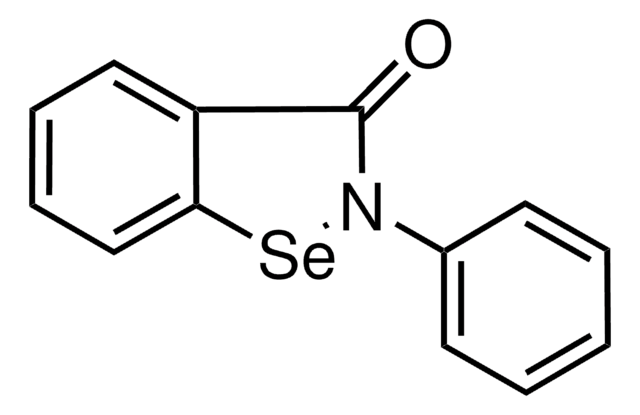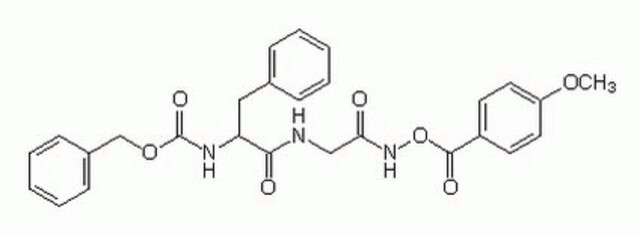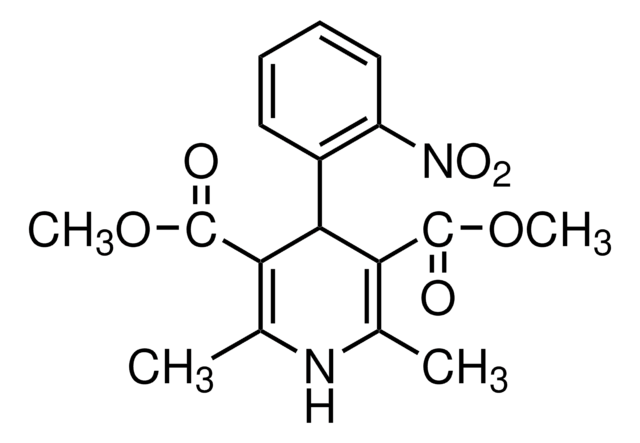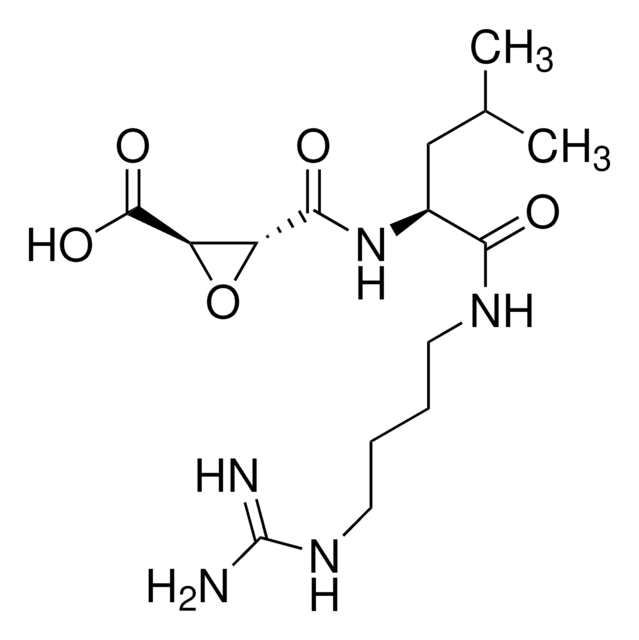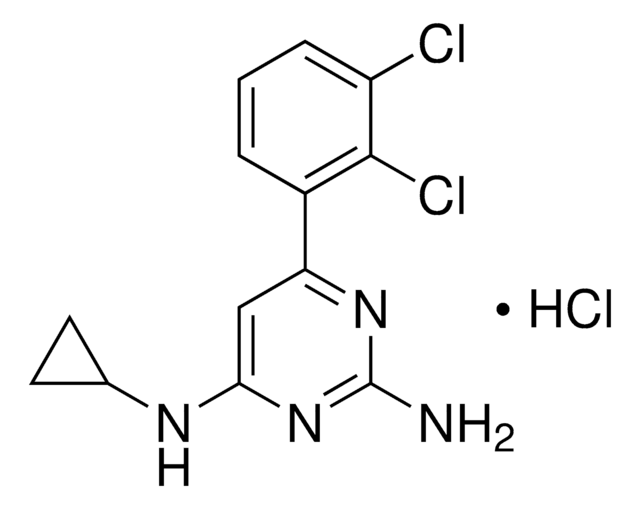C1480
Z-Phe-Ala fluoromethyl ketone
≥90% (TLC), powder
Sinonimo/i:
Z-FA-FMK
Autenticatiper visualizzare i prezzi riservati alla tua organizzazione & contrattuali
About This Item
Formula condensata:
C21H23N2O4F
Peso molecolare:
386.42
Numero MDL:
Codice UNSPSC:
12352209
ID PubChem:
NACRES:
NA.77
Prodotti consigliati
Livello qualitativo
Saggio
≥90% (TLC)
Stato
powder
Colore
white to off-white
Solubilità
DMSO or DMF: 20 mM
Condizioni di spedizione
dry ice
Temperatura di conservazione
−20°C
Stringa SMILE
C[C@H](NC(=O)[C@H](Cc1ccccc1)NC(=O)OCc2ccccc2)C(=O)CF
InChI
1S/C21H23FN2O4/c1-15(19(25)13-22)23-20(26)18(12-16-8-4-2-5-9-16)24-21(27)28-14-17-10-6-3-7-11-17/h2-11,15,18H,12-14H2,1H3,(H,23,26)(H,24,27)/t15-,18-/m0/s1
ASXVEBPEZMSPHB-YJBOKZPZSA-N
Applicazioni
Z-Phe-Ala fluoromethyl ketone (Z-FA-FMK) has been used as a:
- cathepsin inhibitor to study its effects on dendritic cells
- papain-like cysteine protease inhibitor to study its effects on cadmium-induced mitochondrial apoptosis
- cysteine protease inhibitor to study its effects on the interaction of toll-like receptor 9 (TLR9) with granulin in RAW macrophages
Azioni biochim/fisiol
Z-Phe-Ala fluoromethyl ketone (Z-FA-FMK) is an inhibitor of cysteine proteases, such as cathepsin B and L. It can also inhibit recombinant effector caspases 2, -3, -6, and -7 and not initiator caspases 8 and -10. Z-FA-FMK plays a role in blocking nuclear factor κ-light-chain-enhancer of activated B cells (NF-κB) transactivation. It exhibits therapeutic effects against rheumatoid arthritis.
Codice della classe di stoccaggio
11 - Combustible Solids
Classe di pericolosità dell'acqua (WGK)
WGK 3
Punto d’infiammabilità (°F)
Not applicable
Punto d’infiammabilità (°C)
Not applicable
Dispositivi di protezione individuale
Eyeshields, Gloves, type N95 (US)
Scegli una delle versioni più recenti:
Possiedi già questo prodotto?
I documenti relativi ai prodotti acquistati recentemente sono disponibili nell’Archivio dei documenti.
Transcription factor E3 protects against cadmium-induced apoptosis by maintaining the lysosomal-mitochondrial axis but not autophagic flux in Neuro-2a cells
Pi H, et al.
Toxicology Letters, 295(4), 335-350 (2018)
Yun-Pei Zhang et al.
American journal of physiology. Gastrointestinal and liver physiology, 311(6), G1091-G1104 (2016-10-30)
LPS-induced microvascular hyperpermeability and hemorrhage play a key role in the development of sepsis, the attenuation of which might be an important strategy to prevent sepsis. However, the current clinical therapies have proven to be inefficient in improving the prognosis
Man Kyu Shim et al.
Journal of controlled release : official journal of the Controlled Release Society, 294, 376-389 (2018-12-15)
Cancer nanomedicine using nanoparticle-based delivery systems has shown outstanding promise in recent decades for improving anticancer treatment. However, limited targeting efficiency, low drug loading efficiency and innate toxicity of nanoparticles have caused severe problems, leaving only a few available in
Michael J Mitchell et al.
Nature communications, 8, 14179-14179 (2017-03-21)
Physical forces affect tumour growth, progression and metastasis. Here, we develop polymeric mechanical amplifiers that exploit in vitro and in vivo physical forces to increase immune cytokine-mediated tumour cell apoptosis. Mechanical amplifiers, consisting of biodegradable polymeric particles tethered to the
Katherine A Staines et al.
Journal of cellular physiology, 231(6), 1392-1404 (2015-12-08)
The transmembrane glycoprotein E11 is considered critical in early osteoblast-osteocyte transitions (osteocytogenesis), however its function and regulatory mechanisms are still unknown. Using the late osteoblast MLO-A5 cell line we reveal increased E11 protein/mRNA expression (P < 0.001) concomitant with extensive osteocyte dendrite
Il team dei nostri ricercatori vanta grande esperienza in tutte le aree della ricerca quali Life Science, scienza dei materiali, sintesi chimica, cromatografia, discipline analitiche, ecc..
Contatta l'Assistenza Tecnica.


